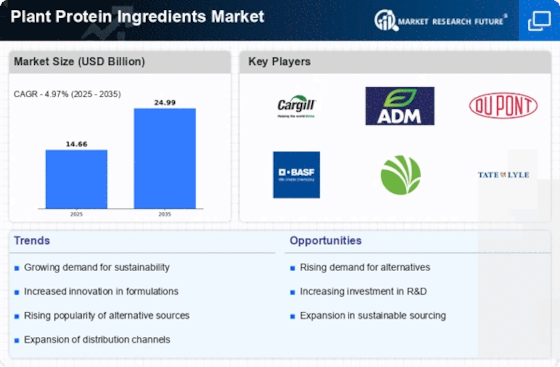Top Industry Leaders in the Plant Protein Ingredients Market

The Competitive Landscape of the Plant Protein Ingredients Market is characterized by a diverse range of key players, both established industry leaders and emerging companies, reflecting the surging global demand for plant-based protein sources. As of 2023, key players in the market have strategically positioned themselves to capitalize on the increasing adoption of plant-based diets and the growing awareness of sustainability and health considerations associated with plant protein consumption.
Key Players:
Archer Daniels Midland Company (US)
Cargill Incorporated (US)
Kerry Group PLC (Ireland)
AMCO Proteins (US)
The Scoular Company (US)
A & B ingredients Inc (US)
Jungbunzlauer Suisse AG (Switzerland)
Glanbia Nutritionals Inc (US)
Roquette Frères S.A. (France)
Reliance Private Label Supplements (US)
Ingredion Incorporated (US)
Cambridge Commodities Inc (UK)
Batory Foods (US)
PLT Health Solutions (US)
Axiom Foods, Inc. (US)
Strategies Adopted:
The Plant Protein Ingredients Market revolve around innovation, strategic partnerships, and sustainable sourcing. Innovation strategies involve the development of new plant protein formulations, including isolated proteins, concentrates, and textured proteins, to cater to the evolving needs of the food and beverage industry. Strategic partnerships with food manufacturers, retailers, and research institutions enhance the market reach and application versatility of plant protein ingredients. Sustainable sourcing practices, including responsible agriculture and supply chain transparency, are critical components of companies' strategies to align with consumer demands for ethically sourced and environmentally friendly products.
Market Share Analysis:
The Plant Protein Ingredients Market is influenced by factors such as ingredient quality, versatility, pricing, and sustainability. Companies that prioritize the production of high-quality, clean-label plant protein ingredients often gain a competitive edge. The versatility of plant protein ingredients, spanning applications in meat alternatives, dairy alternatives, sports nutrition, and snacks, contributes significantly to gaining and retaining market share. Competitive pricing strategies that balance cost-effectiveness with the unique value proposition of plant proteins are essential for attracting a broad customer base. Sustainable sourcing practices, certifications, and adherence to ethical standards further enhance the market position of plant protein ingredient suppliers.
New & Emerging Companies:
The Plant Protein Ingredients Market contribute to the competitive landscape by exploring novel plant sources, developing proprietary extraction technologies, and targeting niche applications. Start-ups such as Beyond Meat and Eat Just have entered the market, focusing on developing plant-based meat alternatives using innovative plant protein formulations. While these companies may initially have smaller market shares compared to established players, their emphasis on innovation and addressing specific market needs adds dynamism and diversity to the plant protein landscape.
Industry Trends:
Industry trends provide insights into ongoing developments within the Plant Protein Ingredients Market. A notable trend in 2023 is the increased investment in research and development to enhance the taste and texture of plant-based meat alternatives. Key players are collaborating with flavor scientists and culinary experts to improve the sensory attributes of plant-based products, aiming to make them more appealing to a wider consumer audience. Additionally, investments in sustainable farming practices, including regenerative agriculture and organic farming, are gaining traction as companies strive to address environmental concerns associated with traditional agriculture.
Competitive Scenario:
The Plant Protein Ingredients Market remains dynamic, with companies adopting diverse strategies to stay at the forefront of this rapidly evolving industry. Digital marketing and e-commerce channels are becoming crucial for companies to connect directly with consumers and communicate the health and sustainability benefits of plant-based proteins. Furthermore, collaborations with chefs, culinary influencers, and foodservice providers contribute to expanding market visibility and driving culinary innovation with plant protein ingredients.
Recent Development
The Plant Protein Ingredients Market is the increasing focus on precision fermentation as a method for producing alternative protein ingredients. Key players are investing in technologies that allow the fermentation of microorganisms to produce proteins with similar characteristics to traditional plant proteins, providing a scalable and sustainable solution to meet the growing demand for plant-based protein sources. This development reflects the industry's commitment to exploring cutting-edge technologies that can contribute to the long-term sustainability of the plant protein ingredients market.











